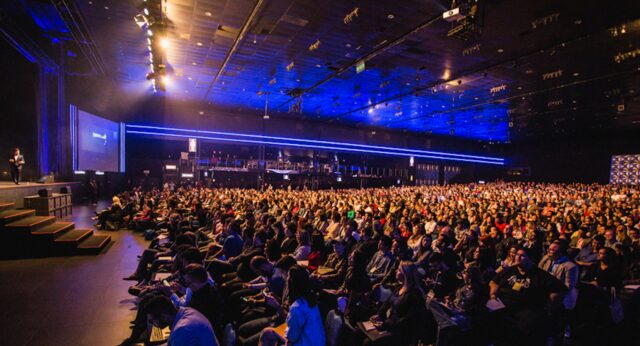
Business conferences have been affected in much the same way as the rest of the events industry in recent years. The pandemic brought an abrupt end to in-person gatherings and uncertainty in terms of the future of business conferences in general.
However, we’ve come a long way since a couple of years ago, and people are now anticipating the return of in-person events. The events industry is also transforming as a result of certain trends such as virtual reality, niche events, and sustainability.
In this article, we take a look at these trends and the future of business conferences.
5 Trends that Will Impact the Future of Business Conferences
- Health and Safety will be a Primary Concern for Organizers
Recent studies suggest health and safety will be a leading concern for conference attendees in the year ahead. With this in mind, health and safety is sure to be a primary focus for organizers that will demand a lot of time and attention.
Many steps are required to mitigate these concerns and any hygiene-related risks that could negatively impact a business conference. Given the extent of fear surrounding this issue, businesses should expect to budget wisely for this particular overhead cost.
But what might this refer to exactly? Everything!
For example, planners will need to pay close attention to on-site cleaning and ensure sufficient ventilation in associated rooms. It’s also necessary to provide sanitization stations and require staff to respect duty of care, maybe by undergoing safety training.
Meanwhile, we should also expect machines to play a role as businesses use smart technology to support health and safety. This can be anything from touch-free sanitizer stations to smart device check-in, but the scope for this one is truly immense.
- More Businesses Will Hold Smaller Conferences
More and more businesses are holding smaller events rather than waiting to cover everything in one large conference. Although largely due to the pandemic and restrictions, these smaller events have proven very successful and easier to manage.
In hindsight, it makes total sense. Frequent events can help build brand awareness and enable businesses to focus on niche topics. This is also a great way to keep attendees up-to-date and address unexpected issues whenever necessary.
Smaller conferences are also in line with the fact that customization is a clear marketing trend for 2022. That is to say, micro events are more meaningful than large gatherings and help create memorable experiences that nurture interaction and positive feedback. These events also require less planning and less attendees to actually go ahead!
- Hybrid Conferences Will Become More Common
Virtual events are here to stay as one of the most powerful means through which to build engagement. Surveys also show that 64% of businesses plan to arrange more hybrid events in 2022, and this eagerness is largely the result of past experience.
Hybrid conferences combine in-person and virtual elements which allow speakers to attend from remote locations. It also works the other way around; participants can virtually attend in-person conferences, which increases the potential of events for organizers.
Hybrid event software plays a central role in the process and allows organizers to deploy television quality production. Event data can be used to personalize the experience for attendees, and feedback is much easier to extract with digital events.
Hybrid conferences can also bring a whole new level of social interaction to the experience. For example, a facilitator can be used to monitor comments or questions from virtual attendees and ensure they feel involved in spite of not being on location.
It also makes sense for organizers because a hybrid conference enables more people to attend, and the virtual element is unlikely to infringe on the proceedings in any way.
But that’s just part of the story for virtual reality and augmented reality.
- Virtual Reality and Augmented Reality Will Begin the Takeover
Virtual reality (VR) and augmented reality (AR) are nothing new, but it’s only in recent years these concepts are starting to become popular with event organizers. If you’re wondering, VR is entirely virtual and AR uses the real world as the setting.
As already mentioned, virtual reality enables participants or speakers to get involved remotely, but augmented reality offers something different. AR tools can be used in business conferences to do things like showcase products, create interactive maps, and help in-person attendees network and interact with virtual reality attendees.
But the scope for using VR and AR in conferences is immense, and we can only imagine the possibilities. As reported by Digital Authority, these smart innovations also provide affordable ways for organizers to improve their business conferences.
- More Focus on Sustainability and Eco-Friendly Ideas
Around the world, businesses are having to commit to more sustainable and eco-friendly practices. We can see this impact in how companies are trying to reduce their carbon footprint, and this transition also applies to event conference organizers.
This means we should see companies using more responsible sources in the year ahead and creating carbon-neutral events, which improve perceptions of the business. It’s not just for appearance either. Businesses will want to demonstrate the ethical side of their brand and encourage attendees to respect this moral stance.
Sustainability is also a big issue for business conferences because the events industry is known to produce a lot of waste in the form of signage, single-use plastic, and free promotional items. Planners are now focused on eco-friendly ideas and aligning their conferences with sustainable initiatives that help the environment.
Final Thoughts
In spite of the pandemic, in-person conferences are making a comeback, and recent trends are transforming the way planners think about these events. Health and safety will be a primary concern, and smaller conferences will become the norm. With virtual and augmented reality, we can also expect many smaller events and hybrid conferences. Businesses will also focus on sustainable ideas that value ethics and morals over size.

































